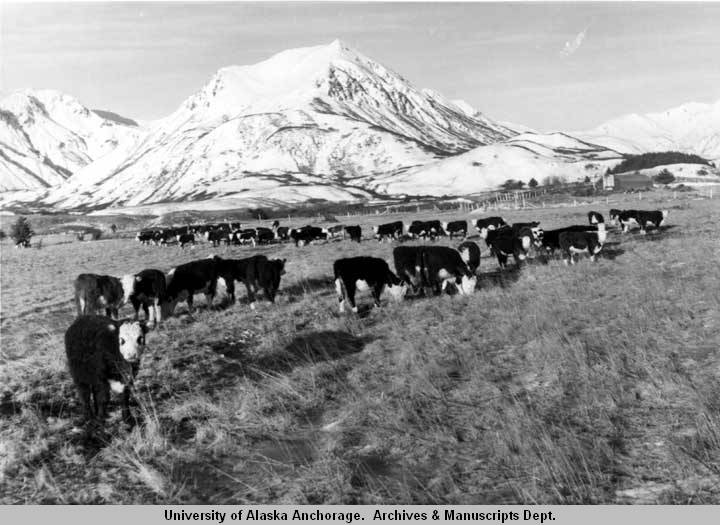OVERVIEW
In this week you will hear stories and accounts of independent livestock producers and their experiences with a variety of domestic ungulates. In part two, we will examine the current state of the reindeer industry in Alaska. Don’t forget to continue working on your final project. It will be due next week.
OBJECTIVES
- Describe the unique challenges faced by livestock producers in Alaska.
- Review the stories and experiences of independent livestock producers.
- Review the current status of the reindeer industry in Alaska.
- Synthesize information from lecture and readings.
- Formulate response to historical questions.
- Discuss and evaluate the arguments of your peers.
Week 5: Many Adventures!
READING
Brown, Tricia. “Cattle Ranching in the Subarctic.” LitSite Alaska. University of Alaska Anchorage, 17 Jan 2014.
Gamble, Mary. “Matanuska Valley Colony Links.” LitSite Alaska. University of Alaska Anchorage, 17 Jan 2014.
Gasser, G. “Agriculture in Various Localities.” Library4Farming. Library4science.com. 17 Jan 2014.
Ebbert, Steven. “Feral Abandoned Cattle Grazing on Two National Wildlife Refuge Islands in Alaska.” Alaska Invasive Species Conference. Alaska Maritime National Wildlife Refuge. Fairbanks, AK. 07 Nov 2013. Lecture.
The Cowboy Kings of Kodiak Island
Yak in Alaska and Canada (only first chapter by Gerald Wiener)
lecTURE
httpv://www.youtube.com/watch?v=uKh-3TVvVeI
httpv://www.youtube.com/watch?v=IkkmFxi0NSM
httpv://www.youtube.com/watch?v=qVEjAyIBYUo
ASSIGNMENTS
Discussion
By Midnight, Tuesday, write a brief (no more than 350 words) response to one of the following questions and post it to the forums:
1. In Alaska, populations of captive ungulates discussed throughout the interviews are dismal when realizing their potential and the amount of available land. Discuss the parallel struggles amongst producers and why so many cannot make it work. What do the production operations in existence have in common?
2. Discuss the aspects of yak production in Alaska that make it a good candidate for a viable red meat industry.
3. “Canned hunts” generate significant revenue for game ranching operations across the U.S. Should “canned hunts” be used to promote economic viability of ungulate producers in Alaska?
Use information from the readings and lecture to support your answers. Read and respond to at least two posts of your peers.
COGNITIVE TUTORIAL
When you’ve completed the lectures and reading materials, give the following Week 5 Cognitive Tutorial a try. These questions were taken from the Week 5 content above. If you are unsure of your answer, take a moment to review the lectures and readings.

